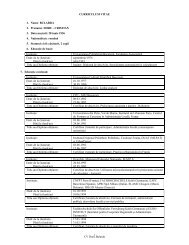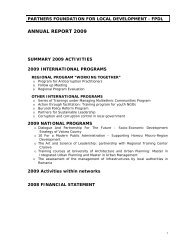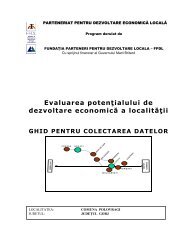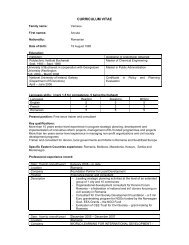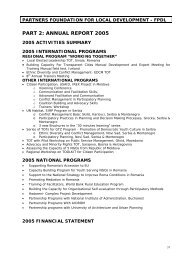Organizational Development: A Manual for Managers and ... - FPDL
Organizational Development: A Manual for Managers and ... - FPDL
Organizational Development: A Manual for Managers and ... - FPDL
You also want an ePaper? Increase the reach of your titles
YUMPU automatically turns print PDFs into web optimized ePapers that Google loves.
scientists (psychologists, sociologists, cultural anthropologists, etc.) try to protect this specific area<br />
of consultancy business from intervention of others, although their own knowledge base <strong>and</strong><br />
instruments are far from being sufficient to meet the challenges that emerge in organizational<br />
development processes. In this manual, we will refer to different kinds of ef<strong>for</strong>ts <strong>and</strong> professional<br />
contributions that may be needed to improve organizations, with some special emphasis on the<br />
topics that are generally not well-addressed in the literature on OD. We will try to expose the<br />
subject matter as fully as possible within this manual. Our subject is organizational development,<br />
not as an academic discipline, but more particularly like a job <strong>for</strong> a manager <strong>and</strong> trainer.<br />
The actual changes in any organization depend on numerous factors: technological, psychological,<br />
social, environmental, cultural, etc. Some factors may be related to in<strong>for</strong>mation systems, others to<br />
professional skills; some may be directly linked to a market, some tied with quality <strong>and</strong> so on.<br />
Nobody can say what is most important <strong>for</strong> organizations <strong>and</strong> what is less significant. Under<br />
certain circumstances any factors may become crucial. And each of these emerging factors should<br />
be addressed accordingly.<br />
When conflict between employees is caused by poor organizational design – a psychologist will<br />
not help. When mistakes in document processing are caused by inadequate technology – a new<br />
system of punishment or motivation will not help. When the mission of an organization <strong>and</strong>/or its<br />
actual role in the market or society is ill-defined – how can this organization be effective? Nobody<br />
can expect quality to improve be<strong>for</strong>e the proper processes are established <strong>and</strong> needed controls<br />
implemented. And so on. Organizations are complex matters. <strong>Organizational</strong> development<br />
processes are manifold. Thus, a wide range of specialized disciplines may be needed, <strong>and</strong> a<br />
manager should be able to employ all of them.<br />
<strong>Organizational</strong> development as a management practice may be defined as the application of any<br />
relevant sciences, knowledge areas, in<strong>for</strong>mation, technologies, skills <strong>and</strong> any other measures that<br />
can help to improve underst<strong>and</strong>ing <strong>and</strong> control of the processes of organizational change.<br />
Where can one obtain the necessary knowledge, relevant to the needs of a particular organization<br />
or situation? The answer is simple – in the organization itself. Usually people in an organization<br />
know their subject areas, have in<strong>for</strong>mation about what is going on around them, <strong>and</strong> have a stock<br />
of experience in matters that count, which is often more than a consultant has to offer. Moreover,<br />
an outsider may not have (or be able to obtain through interviews) all the detailed data regarding<br />
goings on within the organization, or the structure or sub-structures within the organization. Smart<br />
consultants ask people in an organization – but they never have all facts <strong>and</strong> fine points. Thus, in<br />
many cases they are not able to give sound practical advice. What they can do is to enable an<br />
organization to find its own solutions to its own problems.<br />
7



